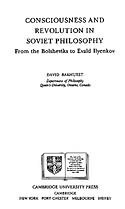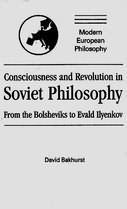David Bakhurst
Consciousness and Revolution in Soviet Philosophy:
From the Bolsheviks to Evald Ilyenkov
Modern European Philosophy Series
Cambridge: Cambridge University Press, 1991
Download this book in DJVU (better quality, ocr) or PDF file

CONTENTS
Acknowledgments page
A note on translation, transliteration, and references ... xi1. Introduction ... 1
Introducing Ilyenkov ... 5
Orthodoxy and history ... 11
Ilyenkov and the Anglo-American tradition ... 17
Ilyenkov’s legacy in the age of glasnost’ and perestroika ... 212. Deborinites, Mechanists, and Bolshevizers ... 25
The beginnings of Soviet philosophy ... 27
The composition of the two camps ... 31
The substance of the debate ... 33
The defeat of the Mechanists ... 45
The aftermath of the debate: The defeat of the Deborinites ... 47
How were the Bolshevizers possible? ... 50
The philosophical significance of the controversy ... 52
Conclusion ... 563. Vygotsky ... 59
The critique of the prevailing climate ... 61
Vygotsky’s functionalism ... 66
Thought, speech, and «unit analysis» ... 68
The independence thesis ... 72
Internalization and the convergence of thought and speech ... 76
Internalization and the critique of Piaget ... 81
Inner speech and thought ... 84
Conclusion ... 864. Lenin and the Leninist stage in Soviet philosophy ... 91
The Leninist stage in Soviet philosophy ... 92
Lenin’s critique of Empiriocriticism ... 99
Lenin’s materialism ... 108
Ambiguity in Lenin’s materialism ... 111
Lenin’s philosophy as politics ... 123
Conclusion ... 1345. Ilyenkov and dialectical method ... 135
The method of ascent from the abstract to the concrete: A synopsis ... 138
Ilyenkov versus the empiricist ... 144
Concrete totality and materialism ... 154
Concrete universals, historicism, and particularism ... 157
Ilyenkov on contradiction ... 167
Conclusion ... 1726. The problem of the ideal ... 175
Ideality, moral properties, and the «ban on anthropocentricity» ... 176
The insight about artifacts ... 181
Agency and the humanization of nature ... 186
Alienation and objectification ... 189
Ideality and the possibility of thought and experience ... 195
Ilyenkov, radical realism, and the critique of «two-worlds epistemology» ... 200
Materialism and the final refutation of idealism ... 212
Conclusion ... 2157. The socially constituted individual: Rethinking thought ... 217
Meshcheryakov and the blind-deaf ... 221
«Brain and Mind»: Dubrovsky versus Ilyenkov ... 227
«Mind and Brain»: Ilyenkov’s reply to Dubrovsky ... 231
Ilyenkov on the ideal: The dismissal of Dubrovsky ... 236
The defence of the antireductionism and antiinnatism theses ... 244
Conclusion: The polemical and the political ... 2538. In conclusion ... 259
References ... 267
Index ... 285
Synopsis
This is the first critical history of the philosophical culture of the USSR,
and the first substantial treatment of a modern Soviet philosopher’s work by
a Western author. The book identifies a significant tradition within Soviet Marxism
that has produced powerful theories exploring the origins of meaning and value,
the relation of thought and language, and the nature of the self. The tradition
is presented through the work of Evald Ilyenkov (1924‑79), the thinker who did
the most to rejuvenate Soviet philosophy after its suppression under Stalin.
Professor Bakhurst sets Ilyenkov’s contribution against the background of the
bitter debates that divided Soviet philosophers in the 1920s, the "sociohistorical
psychology" of Vygotsky, the controversies over Lenin’s legacy, and the philosophy
of Stalinism. He traces Ilyenkov’s tense relationship with the Soviet philosophical
establishment and his passionate polemics with Soviet opponents. This book offers
a unique insight into the world of Soviet philosophy, the place of politics within
it, and its prospects in the age of glasnost and perestroika.
Bibliographic information
| Title | Consciousness and Revolution in Soviet Philosophy |
| Author(s) | David Bakhurst |
| Publisher | Cambridge University Press |
| Publication Date | April 14, 2003 |
| Subject | Philosophy |
| Format | Paperback |
| Pages | 304 |
| Dimensions | 5.50 x 8.50 x 0.69 in |
| ISBN | 0521407109 |
